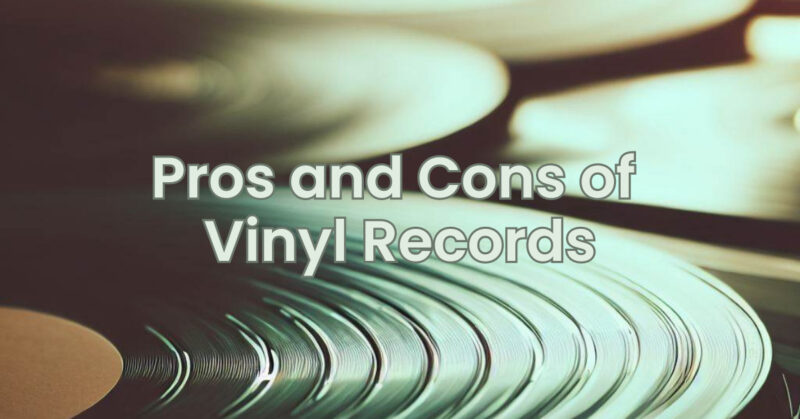Vinyl records have experienced a remarkable resurgence in recent years, captivating music enthusiasts with their warm sound, tactile appeal, and nostalgic charm. However, like any medium, vinyl records come with their own set of advantages and disadvantages. In this article, we explore the pros and cons of vinyl records to help readers make an informed decision about embracing this beloved format.
Pros of Vinyl Records:
- Superior Sound Quality: Vinyl records are renowned for their superior sound quality. The analog nature of vinyl, combined with the larger grooves and needle playback, captures a warm and rich sound that digital formats often struggle to replicate. Many audiophiles argue that vinyl offers a more dynamic and authentic listening experience.
- Tangible and Collectible: Vinyl records provide a tangible and collectible experience that digital formats cannot match. The large album artwork, liner notes, and physical presence of vinyl records create a sense of connection to the music. Collectors value vinyl records as cultural artifacts, pieces of art, and items of historical significance.
- Nostalgia and Intimacy: Listening to vinyl records evokes a sense of nostalgia and intimacy. The ritual of carefully selecting a record, placing it on the turntable, and gently lowering the needle creates a unique connection to the music. The crackling sound and occasional imperfections contribute to a nostalgic atmosphere that transports listeners back in time.
- Album Listening Experience: Vinyl records encourage the art of album listening. Artists often craft albums as cohesive bodies of work, taking listeners on a journey from start to finish. Vinyl’s physical limitations encourage a focused and immersive experience, allowing for a deeper appreciation of the artist’s intended sequencing and storytelling.
Cons of Vinyl Records:
- Fragility and Maintenance: Vinyl records are fragile and require careful handling and maintenance. They can be susceptible to scratches, warping, and damage from improper storage or mishandling. Regular cleaning and proper storage are essential to maintain their sound quality and longevity.
- Limited Lifespan: Vinyl records have a limited lifespan compared to digital formats. Continuous playback and repeated needle contact gradually wear down the grooves, resulting in a gradual degradation of sound quality over time. Even well-preserved records will eventually exhibit signs of wear.
- Inconvenience and Portability: Vinyl records are less convenient and portable compared to digital music. They require a dedicated turntable and audio setup for playback, which can be bulky and costly to acquire. Vinyl records are not suitable for on-the-go listening or easily transported like digital music files or streaming services.
- Background Noise and Imperfections: Vinyl records are prone to background noise and imperfections during playback. Surface noise, pops, and clicks can be present, especially on older or heavily used records. While some argue that these imperfections contribute to vinyl’s unique charm, they can be a distraction for those seeking pristine audio quality.
Vinyl records offer a range of unique benefits and considerations. The superior sound quality, tangible nature, nostalgic appeal, and album listening experience are among the pros that attract enthusiasts to vinyl. However, fragility, maintenance requirements, limited lifespan, inconvenience, and background noise are important factors to consider. Ultimately, the decision to embrace vinyl records should be based on personal preferences, the value placed on the unique qualities they offer, and the willingness to invest in the necessary equipment and care required to enjoy them fully.


